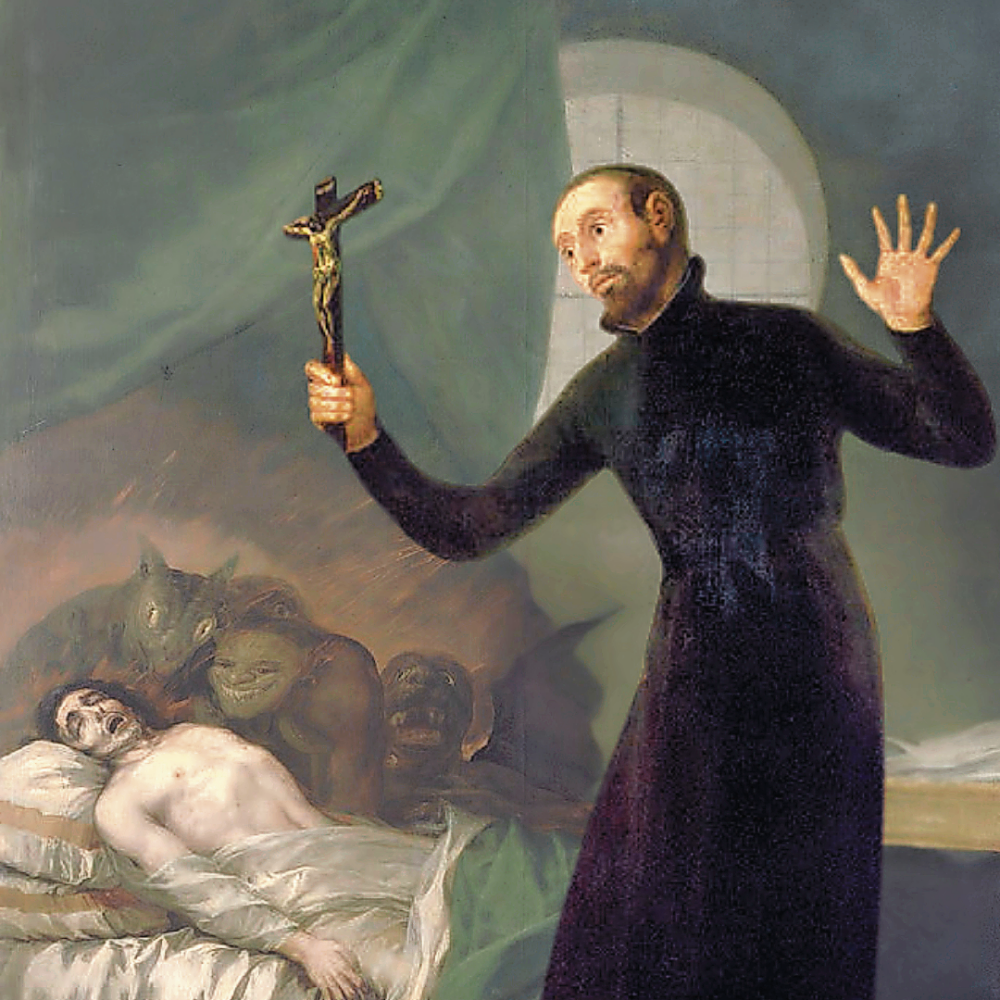
Out, out: Goya’s painting St Francis Borgia Helping a Dying Impenitent may seem a little anachronistic today, but perhaps driving out devils is still needed. Photo: Public Domain
In the northern hemisphere spring of 2025, aspiring exorcists from around the world will again descend on a campus in Rome, where the Catholic Church continues its centuries-old tradition of teaching priests and laity how to cast out demons.
The price for professional training in the ancient rite of exorcism if you are South African? Roughly R35 000 including air fare, but excluding the cost of breakfast, dinner and accommodation in the Eternal City.
Many South Africans will probably be less interested in casting out evil spirits from their neighbours or colleagues and more keen to learn how to expel something far more insidious: corrupt ghouls with taxpayer-funded pensions and VIP protection. But more about that later.
Rome’s week-long course on the Ministry of Exorcism and Deliverance, to be held from 12 to 16 May at the Pontifical Athenaeum Regina Apostolorum, is hosted annually by the Sacerdos Institute.
Although lunch is included — a small mercy — registration costs €575, with an optional €350 fee for real-time translation from Italian into English or Spanish.
This is no online webinar — for reasons one would hope are devilishly obvious. In-person attendance is compulsory. And the curriculum, while spiritually charged, is deeply academic.
Students delve into the theological, liturgical and canonical underpinnings of exorcism, as well as its psychological, neurological and even pharmacological dimensions.
There are legal and forensic aspects too, reflecting a modern understanding of phenomena once blamed on the devil alone.
The programme is open to Catholic clergy and lay people. But don’t just show up clutching holy water. Lay participants must submit a letter of recommendation from a Catholic ecclesiastical authority, a statement of intent, an identity document or passport, and a full CV.
Non-Catholics face even stricter requirements: a formal letter from a Catholic authority attesting to their “moral righteousness” and “benevolent disposition” toward “the Church”.
The rite may conjure images from B-grade horror flicks for most, but Rome treats the topic with sober seriousness — blending ancient ritual with contemporary science in a course where faith meets the unexplainable, and the devil is very much in the details.
In most of the secular world today, demonic possession has been neatly shuffled to the fringes of polite conversation — filed somewhere between Bigfoot sightings and late-night UFO abductions.
Psychiatrists now handle what used to be Satan’s domain, armed with DSM manuals instead of crucifixes. The idea that Beelzebub might be squatting in someone’s soul is more likely to raise eyebrows than alarms.
After all, in an age of wi-fi-enabled toasters and Mars rovers, blaming your bad week on a legion of infernal spirits feels a touch medieval.
Of course, South Africans might argue they confront demons daily — just not the kind that require chrism.
Here, possession takes on a more bureaucratic form, often manifesting in the mostly soulless bodies of elected blood-suckers.
These entities don’t spin heads or levitate furniture; they gorge on public funds and vanish when caught, only to reappear in new posts with intensified appetites for destruction.
While Rome sends exorcists into seminaries, many South Africans wish they could deploy them to parliament, where the signs of infestation are arguably more convincing — and far more expensive.
Into this cauldron we must toss our municipalities, where potholes double as portals to the underworld, and procurement departments operate with all the transparency of a séance. Forget demonic possession — we are dealing with full-scale administrative hauntings.
Given the scale of spiritual affliction in the Republic then, it may be time for citizens to write, ever so humbly, to the Bishop of Rome with a modest request: a group discount.
If airlines can offer reduced fares to sports fans and school tours, surely the Vatican can cut a deal for a nation where exorcism might soon qualify as a form of civic duty?
Bulk rates could apply — not just for priests, but for civil society activists, investigative journalists, and exhausted residents’ association members who have spent one too many evenings staring into the abyss of a municipal audit and seen something truly unholy staring back.
Perhaps the course could offer a South African elective: Demonic Maladministration 101, with case studies from Eskom, Transnet and local municipalities. The final practical exam? Trying to get a water tanker to one’s suburb without divine intervention.
At the rate the ANC is hurtling South Africa towards the depths of hell, we will all need to become demon slayers — not with rosaries, perhaps, but with strong conviction, investigative findings and a legal team that can at least pretend to be ethical until the retainer clears.
Still, a week in Rome, fortified by theology and a daily lunch, might offer the spiritual stamina required to face the Monday morning headlines. And who knows? If the Pope is feeling generous, he might even throw in breakfast.



